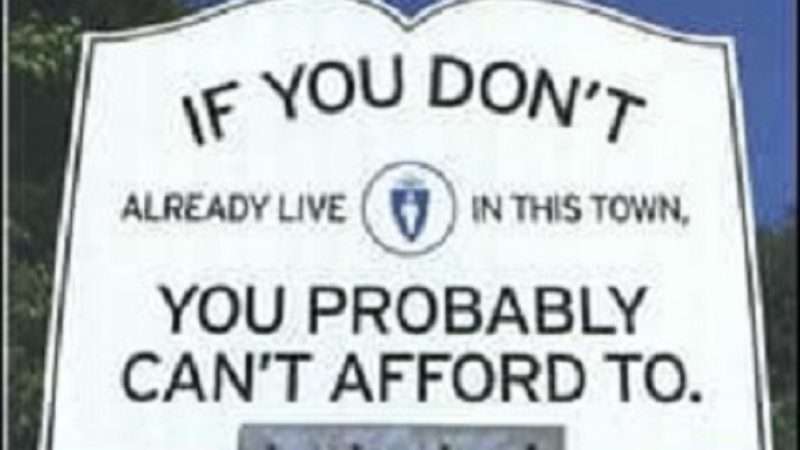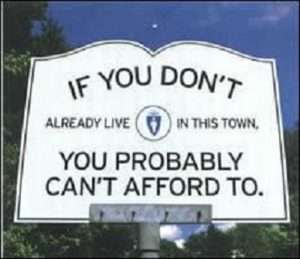

Harvard economist Edward Glaeser is one of the world’s leading experts on housing, urban development, and economic mobility. In a compelling recent article published in the City Journal, he lays out a “four freedoms” strategy for revitalizing American capitalism by expanding opportunity for the young. It’s a must-read for anyone interested in these issues:
A February 2019 Harris poll found that roughly half of younger Americans would “prefer living in a socialist country.” Millennials may not fully grasp the consequences of the government owning the means of production, but they certainly don’t like how American capitalism is working for them. They have a point. Over the past 40 years, insiders have increasingly captured the American economy—from homeowners opposed to new housing construction near them to incumbent firms that benefit from the overregulation of employment to interest groups that have transformed the federal government into the equivalent of a pension system with a nuclear arsenal. The young are usually outsiders; the bill for the insiders’ triumph has been laid in their laps….
What many young people today don’t realize is that socialism is a machine for empowering insiders. Few insiders have ever been rewarded more assiduously than the nomenklatura of the Soviet Union. Few governments have been as gray—in every sense of the word—as the Brezhnev regime. A vast expansion of the American government, as imagined by today’s Democratic Socialists, would create its own privileged elite….
These days, capitalism’s advocates often focus more on defending the status quo than on promoting outsider opportunity. If capitalism is to win over the young, that must change—and a new freedom agenda can help make that happen. In January 1941, Franklin Roosevelt announced his four freedoms (of speech and worship, from want and fear) that helped frame his objectives for World War II, which the nation would enter before the end of that year. Our contemporary outsiders would benefit from a renewal of four key freedoms: to build, to work, to sell, and to learn. The young need fewer land-use restrictions that make it tough to provide affordable housing in productive areas. They need fewer employment rules that limit their ability to find work, as well as fewer business regulations that suppress entrepreneurial energies. And—even before these other important things—they need new educational options that liberate them from underperforming educational monopolies.
The rest of the article expands on the four freedoms in greater detail. In doing so, Glaeser builds on his earlier pathbreaking work on the harm caused by policies such as exclusionary zoning, which makes it difficult or impossible to build new housing in many , thereby shutting out millions of people (particularly, the young, the poor, and racial minorities), from valuable job opportunities. There is a similar story to be told about occupational licensing restrictions, which similarly protect insiders from competition, lower mobility, and make it difficult for the young and the poor to start new careers.
As Glaeser notes, his critique of public education is reinforced by its awful performance during the coronavirus pandemic, where numerous public schools have been shut down at the behest of politically powerful teachers’ unions long past the point where evidence showed that schools do not pose a significant risk of spreading the disease, even as most private schools have remained open and continued to serve students with little or no added Covid spread, as a result. The obvious difference is one of incentives: private school administrators and teachers only get paid if they provide useful services to students and their families, while their public school counterparts can subsist off of taxpayer dollars even if they provide nothing but grossly inadequate “virtual” education.
Besides expanding opportunity for the young, the common theme between Glaeser’s proposed reforms is that they all empower people to “vote with their feet” rather than remain hostage to the decisions of government officials, interest groups, and political majorities. Under Glaeser’s “four freedoms” approach, many more people would be able to choose housing, job, and educational opportunities for themselves, regardless of regulatory dictates and majority public opinion. In this respect, his view is highly congruent with what I advocate in my recent book on foot voting, Free to Move. And I in fact owe a considerable debt to Glaeser’s earlier work on these issues, particularly zoning.
I do disagree with Glaeser on a few of the points in his article. I fear he relies too much on an implicit model of politics where most voters are motivated by promoting their own narrow economic self-interest. Thus, he argues that young people have become more sympathetic to socialism because they think it will enable their own economic advancement, while the elderly and suburbanites have voted for policies that harm the young primarily because they benefit the old. In reality, extensive social science evidence suggests that there is only a weak connection between most voters’ views and narrow economic self-interest. I summarize some of the relevant data in my book Democracy and Political Ignorance, and here is an earlier review by Bryan Caplan.
This is also true of many of the programs Glaeser criticizes for benefiting the elderly at the expense of the young. For example, public support for Social Security and Medicare differs very little by age. Similarly, it is far from clear that support for policies like occupational licensing and exclusionary zoning is correlated with age or other indicators of self-interest. It is likely that the persistence of these policies is due more to voter ignorance about their effects, than to self-interested calculations.
More generally, I think Glaeser somewhat overestimates the role of selfish voters and nefarious insiders in promoting dysfunctional policies in these areas, and understates the role of well-meaning but often ignorant voters and activists. Ironically, Glaeser has previously coauthored important work on how political divisions in the United States are often due to cultural and religious conflicts, rather than economic self-interest.
In his warnings about the dangers of millenial sympathy for socialism, Glaeser similarly overemphasizes the role of insider favoritism for elites as a downside of socialist policies, and understates the much greater risks of total or near-total government control of the economy, such as large-scale poverty, oppression, and mass murder. Currently fashionable “democratic socialism” poses many of the same dangers as earlier explicitly authoritarian versions.
Public ignorance may make it more difficult to enact many of Glaeser’s preferred reforms. But success in such efforts is far from impossible, as shown by the recent successes of efforts to combat exclusionary zoning and reform occupational licensing, in several states.
The cultural and religious dimensions of current political conflict also suggest that Glaeser’s “four freedoms” may not dissipate millenial sympathy for socialism as much as he hopes. That said, it is hard to deny that economic stagnation contributes to sympathy for socialism on the left and statist nationalism on the right. Expanding opportunity and economic growth could help curb both of these dangerous trends.
More importantly, Glaeser’s reforms are worth pursuing because they are right, whether or not they will also have beneficial effects on public opinion. Expanding freedom and opportunity for the young and the poor is a vital moral imperative. And a more dynamic and open economy will also provide important benefits for many who are neither young nor poor themselves—including those of us who want to see greater opportunity for our children.
from Latest – Reason.com https://ift.tt/3b6tto7
via IFTTT